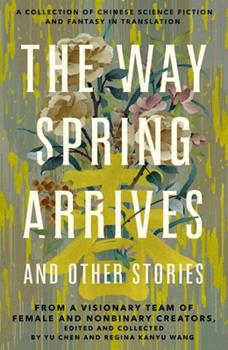THE WAY SPRING ARRIVES And Other Stories

ed. by Yu Chen and Regina Kanyu Wang
Tor Books
(www.tor.com)
2022, 396 pages, $26.99
ISBN 978-1-250-76891-9
Click Here to Purchase
In this landmark anthology, the very short but compelling story, “What Does the Fox Say?” by Xia Jia takes a good, long look into what differentiates us as humans from artificial intelligence in not only creating, but truly understanding and appreciating the nuances between the two. Like AI, perhaps what we create in our minds is merely an illusion. Illusions can be interpreted many different ways.
In “Blackbird” by Shen Dacheng, residents of a nursing home have their own stories to tell, their own passions and dreams, no matter their aging disabilities. No matter their age, because even someone such as Mrs. An has the power to influence, to decide, to fix the realities experienced by some residents.
“The Future of Genders in Chinese Science Fiction” by Jing Tsu. While this essay spends some time trying to pin down the topic of whether or not transgenderism will gave a greater role in SF, the message here is that Chinese SF, like American SF, will evolve as a reflection of the times.
“Baby, I Love You” by Zhao Haihong. A popular video game designer incorporates his own real-world experience as a parent to integrate the most vital segments of parental reality into a video game called “Raising Baobao.”
“A Saccharophilic Earthworm” by BaiFan Ru Shuang. The lady of the house who cares for the houseplants within it, Flora, is also a Broadway director, and is emotionally very connected to her roses, St. Bernard’s lilies, spider plants and devil’s ivy. She directs them to a life, literally, of their own.
The title story by Wang Nuonuo is a vignette about the ability to foresee and guide the power of spring, and those blessed with the ability to greet and guide the world springing afresh.
A feminine quietness. Feminine? How does gender apply? When translating prose, does a translator successfully capture the nuances of a society’s language? These are only some of the questions answered in “Is There Such a Thing as Feminine Quietness? A Cognitive Linguistics Perspective” by Emily Xueni Jin.
“The Woman Carrying a Corpse” by Chi Hui. This fable-like story tells about a woman who carries around, like a cross, a nicely dressed corpse. She encounters all sorts of misfits that question her carrying the corpse, poking fun at her. Until the madman arrives with some of his accompanying magic.
There are additional essays about the hard-fought work involved in translating these tales, by Rebecca F. Kuang and others. This includes the “She Era” introduced and defined by Xueting Christine Ni, pointing toward a new age for Chinese SF, in “Net Novels and the ‘She Era’: How Internet Novels Opened the Door for Female Readers and Writers in China.”

